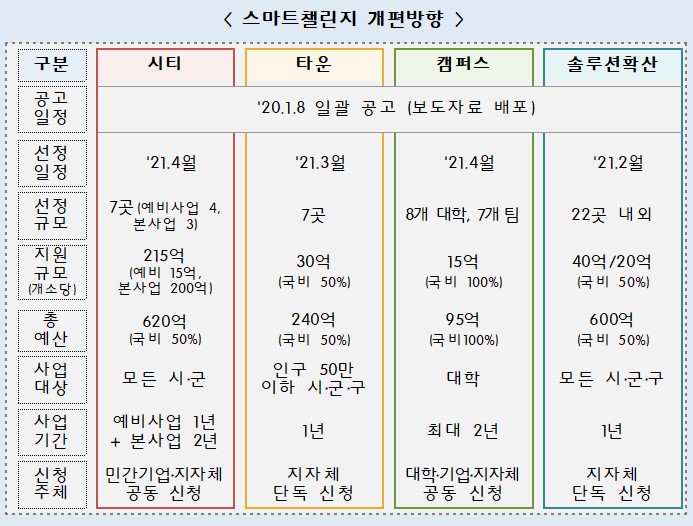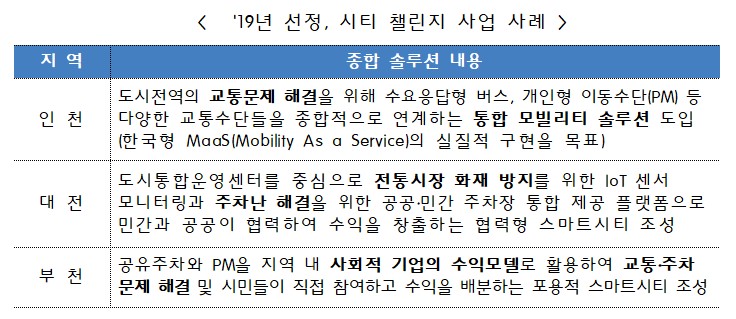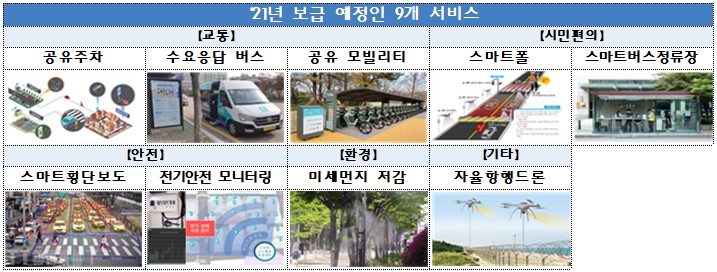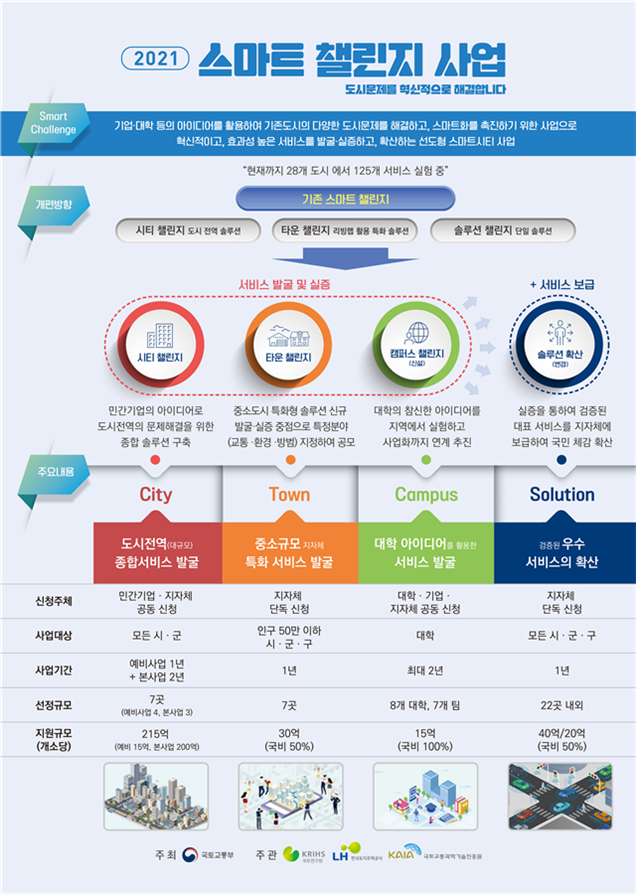-Starting a public offering project for smartization of existing cities from the 12th-
◈ A total of 44 locations this year were selected to discover and distribute smart solutions with a scale of KRW 1,555 billion
◈ In addition to the City Challenge, which demonstrates a comprehensive solution across the city, and the Town Challenge specialized in small and medium-sized cities, in '21, the Campus Challenge, a solution expansion project was established.

□ The Ministry of Land, Infrastructure, and Transport will start the '21 Year Smart Challenge Project' contest on January 1, where citizens, businesses, and local governments work together to find and create innovative services to solve existing urban problems.
ㅇ This year, the scale of the project has been greatly increased from 18 last year to 44 in order to fully spread and expand smart city services, and a new'Campus Challenge' project will be introduced to discover new ideas based on the university's R&D achievements.
1. (City-level comprehensive solution) City Challenge
□ City Challenge is a project in which companies and local governments form a consortium to develop a comprehensive solution to solve problems across the city.

ㅇ This year, four cities were selected to establish a master plan and a pilot project (government cost of 4 billion won/location), and two of them were selected as the main project and 15 billion won (government cost of 2 won) for two years. %) each.
ㅇ Local governments carrying out the City Challenge project plan to establish a'smart city plan' that implements various smart services such as transportation, environment, and energy in urban spaces to promote smartization across the city.
2. (Small and medium-sized city-specific solutions) Town Challenge
□ Town Challenge is a project that focuses on proposing and applying specialized solutions* optimized for small and medium-sized cities.
* Case: (Bucheon) Air quality measurement and purification devices installed in school roads and subway stations to reduce fine dust, (Seongdong-gu, Seoul) floor signal, stop line violation guidance, etc. Smart crosswalk installation
ㅇ The competition target is limited to cities, counties, and districts with a population of less than 50*, and a total of 4 locations are selected and proceeded at a scale of 1 billion won (30% of government expenses) per year.
* People with a population of over 50 can apply for special or metropolitan cities
ㅇ It is planned to focus on discovering new services in the relevant field through a designation contest for transportation, environment, and crime prevention fields of interest in the region.
3. (College Idea Connection) Campus Challenge
□ Starting this year, the'Campus Challenge' will be introduced, in which companies and local governments experiment with and commercialize smart services in the region, centering on universities.
ㅇ A total of 2 universities were selected in two fields, including a research subject-linked type that utilizes university's research projects (R&D) and intellectual property rights, and a community-connected type that tests services using various public information, up to KRW 8 billion each. Apply over two years.
ㅇ Separately, we plan to hold an idea contest for university students to propose solutions for smart city implementation, select 7 teams, and support 1 million won per team. For best practices, it plans to provide business start-up support such as management consulting and commercialization funding.

4. (Distribution of excellent solutions) Solution diffusion business
□ This year, we will significantly expand the'Smart Solution Spreading Project' so that citizens can experience smart city services by distributing smart solutions with proven effectiveness nationwide.
ㅇ The distribution will be doubled from 10 locations last year to 22 locations this year, and the scale of the project is expected to increase significantly from 2 million won per city to 6-20 billion won (40% of government expenses).
□ This year, we will verify effectiveness and excellence through the Smart Challenge project, and select and distribute nine services focusing on transportation and safety-related solutions that are close to people's lives. It is promoted in a way that local governments can easily select and utilize solutions optimized for solving problems in each city.
ㅇ The services provided this time include'Smart Crosswalk'*, which includes information on pedestrian safety and vehicle stop line compliance, and'Smart Pole', which combines CCTV, Internet of Things (IoT) sensors, and WiFi on streetlights. 'Shared parking' that can connect public and private parking lots,'demand-responsive bus' that flexibly operates routes in real time according to traffic demand,'autonomous navigation drone' that can be used for disaster/accident detection and delivery to island areas ** etc. are typical.
* Seongdong-gu, Seoul ('19 Town)-An excellent case where there were many inquiries from other local governments as the number of vehicle stop line violations decreased by 75% due to the operation of a smart crosswalk and the resident satisfaction was high.
** Seosan, Chungcheongnam-do ('20 solution)-Using drones, emergency goods delivery time is reduced by 56% (90 minutes → 40 minutes), and quick response time in case of accidents is reduced by 77% (30 minutes → 7 minutes)

□ This year's Smart Challenge project contest will be announced on January 1.12th, and after a one to two month application period for each project, the solution diffusion project will be evaluated in the first stage (in writing), and the City/Town/Campus Challenge will be evaluated in the second stage (in writing). Presentation), a total of 1 locations will be selected.
*Business announcement (1.12) → Solution selection (end of February) → Town selection (end of March) → Campus (early April), City (end of April)
ㅇ Details on the contest can be found on the Smart City General Portal (smartcity.go.kr).
□ Meanwhile, for the city and town challenge preliminary project areas* selected last year, six main project areas (2 cities and 6 towns) will be decided through competition in February, and the results of each project will be promoted in earnest.
* (City) Gangneung‧Gimhae‧Busan‧Jeju/ Changwon‧Suwon‧Gwangju, (Town) Wonju‧Seosan‧Gwangyang‧Changwon
□ Urban Policy Officer Im-Rak Choi, Ministry of Land, Infrastructure, and Transport said, "We will focus on spreading smart city solutions nationwide so that the people can feel the effects of smart city evenly."
ㅇ “Along with this, we will focus on finding innovative services and commercializing them to further strengthen the smart city industry ecosystem.”

☞ Go to the announcement of the 「2021 Smart Challenge Project」



